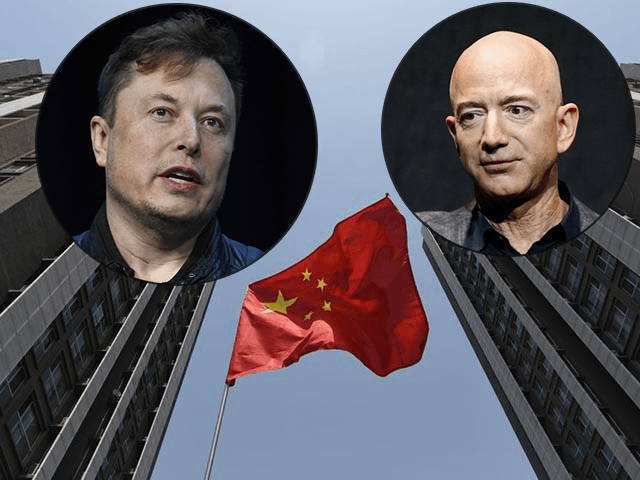China’s state-run Global Times on Tuesday rushed to defend Twitter’s new owner-to-be, Elon Musk, from criticism by Amazon and Washington Post owner Jeff Bezos.
The editorial sneered that Bezos’ musings about Communist China using economic leverage over Musk to control Twitter were merely “sour grapes” from the Amazon billionaire to the Tesla billionaire.
The Global Times managed to squeeze a few sour grapes of its own into the editorial, citing “Chinese observers” who said Twitter should “stop throwing labels around” – in other words, labeling Chinese Communist government agents, state media, and propagandists as such.
With that bit of whine bottled, the editorial went on to lambaste Bezos for suggesting China could threaten his Tesla business interests to control speech on Twitter. The Global Times speculated Bezos did this “to hinder the buyout, partly because Musk’s Tesla has been successful in China while Amazon failed to make inroads in the Chinese market.”
More “Chinese experts” sallied forth to suggest Bezos was hypnotized by the pervasive and unreasonable anti-China bias in western media:
“Using the issue of China’s so-called influence to question Musk is just ‘sour grapes’ mentality,” Shen Yi, a professor at the School of International Relations and Public Affairs of Fudan University, told the Global Times on Tuesday.
In Western countries, criticizing China has become normal, so Bezos’ claims may seem persuasive, he said. But Bezos’ tweet reflected his mindset of imposing a baseless political interpretation on a business deal which is just aimed at making profit, a Beijing-based expert on geopolitics and US-China relations who preferred not to be named told the Global Times on Tuesday.
In some Western countries, there has been deep-rooted bias that China has no freedom of speech. But the “free speech” they advocate is usually criticism and smearing of China, and Bezos is one of them who always shares this bias and double standards toward China, he said.
That’s an awfully ungracious way for China to talk about Jeff Bezos, who literally sold space in his Washington Post newspaper to the Chinese Communist government so it could pump its propaganda directly to American readers. The Washington Post was not alone in this arrangement. Chinese state media paid $19 million over four years to promote its content to outlets including the Wall Street Journal and New York Times, plus various city newspapers across America.
Whatever “anti-China bias” might exist among U.S. media organizations, it clearly does not keep them from taking Chinese money to run “advertisements” and “special inserts” written in Beijing – a topic examined at length in Breitbart News Editor-in-Chief Alex Marlow’s book Breaking the News: Exposing the Establishment Media’s Hidden Deals and Secret Corruption.
The Global Times insisted Musk’s stance as a “free speech absolutist” required him to give more unfettered Twitter access to Chinese Communist officials, including banned companies with links to Chinese military intelligence.
“In March, Twitter started flagging tweets from any individual account that includes a URL from what it considers to be a Chinese state media website, and such a move has caused inconvenience to the media and online users,” the editors complained.
In truth, allowing the authoritarian Chinese regime or any its media organs to use Twitter at all is absurd, since the regime bans Twitter for its own subjects, herding them into a tight-controlled platform called Weibo that has been walled off from the rest of the global information sphere. A truly “free speech absolutist” stance for Twitter’s new owner would be banning operatives from any government that forbids its own citizens from using the platform.
Of course, if Musk issued any such decree, the Communist government almost certainly would retaliate against his business interests in China – unless the gang in the Politburo was reluctant to demonstrate that Jeff Bezos’ grapes were not so sour after all.

COMMENTS
Please let us know if you're having issues with commenting.